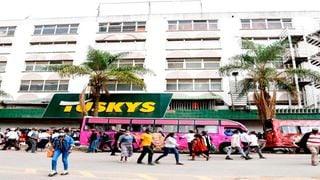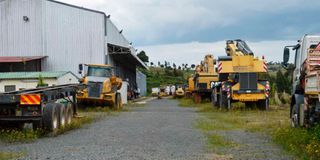
Tuskys Imara building along Nairobi's Tom Mboya Street, which is to be auctioned on March 2, 2022.
| Diana Ngila | Nation Media GroupCompanies
Premium
It is payback time as banks chase loans
When a forest catches fire, predator and prey ran alongside, but in the end, the food chain reasserts itself very quickly.
At the height of Covid-19 scourge, bankers agreed to restructure over half of their outstanding loans including letting customers extend repayment periods and offered a temporary freeze on interest and principal payments.
The fear of widespread defaults was all too real and in any case, getting buyers for distressed properties was quite doubtful given the economic downturn. So lenders bade their time.
As the cloud of Covid-19 clears, banks are reasserting themselves and have come for their pound of flesh from dozens of struggling firms and all we hear is the fall of the auctioneer’s hammer.
The list has been unfolding from the famous owner of central business district eatery K’osewe, Tuskys, Uchumi and even Nairobi City County, to former political figures such as John Mututho, their properties are going once, going twice and hitting the gavel.
Decade-long debt
When the High Court allowed KCB Group to enforce an award of Sh4.3 billion against Nairobi, they were settling a score for a decade-long debt that had seen the devolved unit move from a county council, a county government to a military outpost.
The original loan was borrowed from Equity Bank in 2011, but a fallout saw it change hands to KCB Bank before another fallout led to arbitration and the courts to make good the payments.
The Sh4.3 billion has been growing over the years and efforts by the lender to be paid the money have been frustrated by the defaulting City Hall.
Latest efforts by the county government to challenge the amount was dismissed by Justice Chacha Mwita saying the county government failed to give a satisfactory explanation, for the delay in moving to court.
The lender moved to court in 2020 seeking recognition of the award by Phillip Bliss Aliker, an arbitrator who was chosen by both parties.
Continued to default
City Hall continued to default on the loan even after an arbitrator confirmed KCB’s claims and directed the Nairobi county government to settle the dues.
In his ruling, the judge said there was no dispute that parties agreed to go for arbitration, settled on Mr Aliker and made arguments before him.
The arbitrator published the award in November 2019 and confirmed it in May 2020. The amount includes Sh4.29 billion of the award and costs of the case at Sh6 million.
The loan was initially provided to the defunct Nairobi City Council by Equity Bank. The debt was inherited by Nairobi County following creation of devolved governments in 2013.
KCB bought the loan from Equity in September 2014, offering better terms on the credit facility to the county government.
Evidence presented before court showed that Equity had lent the defunct Nairobi City Council Sh5 billion in 2011.
Statutory debts
The money was supposed to help pay off statutory debts to allow the city council access Local Authority Transfer Funds, which represented resources previously provided by the national government before creation of counties to boost service delivery at the grassroots.
The remittances were made directly to the National Social Security Fund, the Kenya Revenue Authority, the Local Authorities Pension Trust and the Local Authorities Provident Fund.
Equity said in 2014 that City Hall owed it Sh4.75 billion, including an overdraft of Sh1.45 billion.
When KCB took over the loan in September 2014, it gave the county more time to repay the debt by increasing the maturity period to eight years at an interest rate of 13 per cent.

Mr Atul Shah, CEO of fallen retail giant Nakumatt, at the demolished Ukay mall in Westlands Nairobi in August 2018. Last year, KCB Group was allowed to auction his property over a Sh2 billion debt.
Atul Shah property
Last year, KCB Group also won the sprint against three other banks to auction a prime property belonging to the chief executive of fallen retail giant Nakumatt, Atul Shah, over a Sh2 billion debt.
This was after High Court Judge Alfred Mabeya allowed it to complete the sale of the property in Industrial Area, Nairobi- which was also charged to Bank of Africa, DTB Bank and Standard Chartered.
The bank sold the property to Furniture Palace International Ltd for Sh1.04 billion, although Mr Shah accused the lender of undervaluing the property yet he had found a good buyer.
Nakumatt owed Stanchart and DTB Bank a combined Sh4.5 billion and court documents show that they were also eyeing the Sh2 billion property.
Still last year in October, auctioneers descended on another property belonging to Mr Shah over the balance of the loan.
KCB Group, through Phillips International Auctioneers, said it found a buyer for the four-bedroom villa with a servant’s quarter, in Nairobi’s Lavington area.
The house was put up for sale in August last year and the buyer was willing to raise the Sh30 million, the bank was seeking.
Tuskys building for sale
And last week, Equity Bank put up for sale Tuskys Supermarket’s five-storey commercial building at the junction of Tom Mboya Road and Accra Road in Nairobi over a debt of Sh650 million.
The premises, which houses the retailer’s largest store will be put under the auctioneer’s hammer tomorrow (Wednesday).
The former retail giant borrowed a loan from Equity Bank in 2014 and has defaulted on payment, forcing the lender to auction the property.
In April last year, Equity Bank also sought to sell a mult-imillion-shilling matrimonial home of former Naivasha MP John Mututho, over a Sh20 million accrued debt.
The former legislator, however, rushed to court and obtained an order stopping the sale of the prime property in Nairobi’s Riruta area, comprising an eight-bedroom double-storey residential house, pending the determination of his case. The MP allegedly took a loan of Sh9 million over 20 years ago.
And in October last year, UBA Bank sought to sell Uchumi’s Supermarket land situated on Lang’ata Road over a debt of Sh172 million.
UBA moved to the High Court saying that Uchumi has failed to implement a Company Voluntary Agreement (CVA) agreed a year earlier, between the supermarket and some 121 suppliers on how to settle Sh4.2 billion owed to them.
Under the CVA deal that was initially opposed by UBA Bank, the retailer was to form a committee to ensure the payments are made on time.
“The company’s (Uchumi) failure to review and meet the terms of the CVA has had a detrimental effect on the Applicant/Bank as a secured creditor as it unjustly relieves the company of its obligation to service the loan facility extended to it,” the application said.
In default for years
The lender says Uchumi has been in default of its facility for years, terming it as a huge concern to both the bank and its regulators given the negative impact it has on its depositors’ funds.
“That in view of the foregoing, it is in the interests of justice and fairness that the applicant/bank be granted leave to enforce its security,” the lender said.
Another financier seeking to auction a customer’s property is GT Bank, which sought to sell assets belonging to popular restaurant owner William Osewe Guda, popularly known as K’Osewe, over a debt of Sh330 million.
Mr Oguda, however obtained an order from the Court of Appeal, freezing plans to sell a stalled four-star hotel in Kisumu and apartment in Nairobi’s South C, pending the hearing of his case.
The restaurateur was given 45 days to deposit Sh25 million in court as a condition for stopping the auction. The bank has been trying to auction the property since 2018 and Mr Oguda defended himself saying he has been servicing the loan despite disruptions caused by Covid-19 pandemic.

Abandoned construction machines at the site of the failed multi-billion shillings Itare dam in Kuresoi North, Nakuru County. Late 2021, Absa Bank sold part of the 98 vehicles it financed in 2017 to bankrupt Italian firm CMC Di Ravenna which had won the tender to build the dam.
CMC Di Ravenna
And late last year, Absa Bank sold part of the 98 vehicles it financed in 2017 to bankrupt Italian firm CMC Di Ravenna.
The lender agreed with Rift Valley Water Works Development Agency, to sale some of the vehicles, which were not contested.
Documents filed in court showed that Absa and the Italian firm entered into a deal for asset refinancing in June 2017 where CMC transferred an equal joint ownership interest in the motor vehicles and equipment to the bank.
CMC later defaulted in servicing the loan and Absa commenced the process of repossessing the vehicles in a bid to recover Sh585 million loans advanced to the contractor.
The bank said it loaned CMC Di Ravenna Sh585 million for the purchase of the vehicles and equipment to be used in the project.





